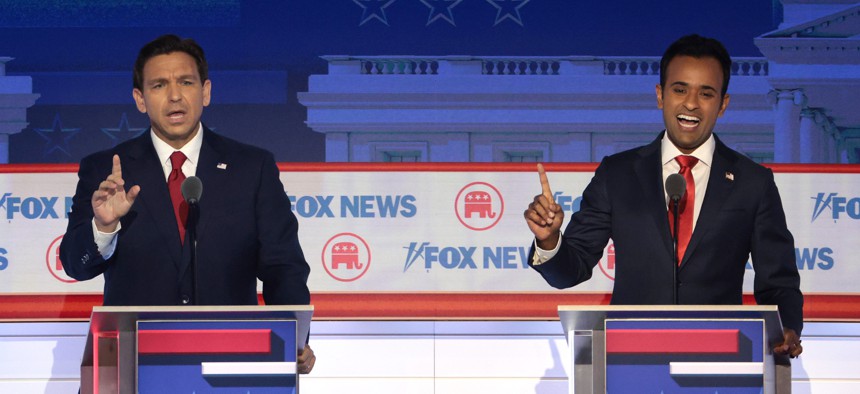Politics
Taking a page from Ron DeSantis, Vivek Ramaswamy promises massive job cuts across federal government
'Large-scale, mass layoffs are absolutely what we will bring to the D.C. bureaucracy,' Ramaswamy said at the America First Policy Institute.

Republican presidential candidates Ron DeSantis (left) and Vivek Ramaswamy participate in the first debate of the GOP primary season hosted by FOX News at the Fiserv Forum on August 23, 2023 in Milwaukee, Wisconsin. Photo by Win McNamee/Getty Images
After fellow GOP candidate Ron DeSantis made a similar pledge, Republican presidential hopeful Vivek Ramaswamy now says federal agencies will experience mass layoffs in 2025 if he is elected, eventually leading to an elimination of 75% of all civilian employees.
The president can circumvent civil service laws and congressional mandates through established reduction-in-force, or RIF, procedures, Ramaswamy said at a speech in Washington on Wednesday.
The private sector entrepreneur, who has consistently polled third in national surveys of the Republican field, said he would be able to slash 50% of federal workers – or about 1 million jobs – within his first year in office.
His comments come a little over a month after a controversial remark by DeSantis, Florida's governor, who vowed to reduce the size of the federal workforce on his first day in the Oval Office: “We’re going to start slitting throats on day one.”
DeSantis previously promised, if elected, to eliminate the departments of Commerce, Education and Energy, as well as the Internal Revenue Service. He promised to make cuts to some workforces across the government and said he would take power away from unelected bureaucrats who have presided over an "accumulation of power over decades."
Related coverage –
- DeSantis vows to 'start slitting throats' of federal workers 'on day one' of presidency
- DeSantis pledges to eliminate agencies, slash federal workforce, following long line of recent GOP candidates
- Florida Gov. DeSantis calls for 'cleaning out' federal science agencies
- DeSantis, Trump both favor revival of federal political patronage system
Ramaswamy called it a myth that the president cannot single-handedly set human resources policy within the federal government, noting that U.S. Code allows the executive branch to advance policies that advance the efficiency of the civil service.
He also noted federal law calls for the president to “prescribe rules governing the competitive service,” though he ignored the decades of legal precedent and overlapping statute that has defined and restricted the executive branch’s leeway in issuing those rules.
Even when it has won congressional backing, recent administrations have encountered significant difficulty in easing the firing of federal employees.
To get around any restriction he might encounter, Ramaswamy said he would simply issue mass RIFs that are not typically constrained by the same restrictions.
“These rules are designed to protect those employees from individual politicized retribution,” Ramaswamy said at the America First Policy Institute. “Like it or not, that is what the civil service rules say. But they do not apply to reductions in force — large-scale, mass layoffs — and large-scale, mass layoffs are absolutely what we will bring to the D.C. bureaucracy.”
Ramaswamy wants to empower elected leaders over 'managerial bureaucracy'
The only rules he must follow when issuing the RIFs, he said, are requirements to provide 60-day notice and procedures on who must be laid off first. His strategy runs counter to the information “fed to” past presidents such as Ronald Reagan and Donald Trump, he said, and he would create a litmus test that any official nominated to serve in a cabinet-level position must be willing to oversee the layoffs.
He said his approach would empower elected leaders over “the managerial bureaucracy in three-letter government agencies.”
He applauded Trump administration officials, many of whom were in the room for his address Wednesday, for their ultimately unsuccessful 11th-hour attempt to implement the policy known as Schedule F, which would have stripped tens of thousands of federal workers of most civil service protections.
He said that plan, however, amounted to “incremental reform,” whereas he was proposing “a revolution.” Trump has vowed to bring back and expand Schedule F, while other candidates have expressed an openness to similar policies.
Ramaswamy’s plan is still likely to encounter significant hurdles and resistance.
Congress typically includes in its appropriations bills requirements that the money not be redirected or used for reorganization without express sign off from the legislative branch. Even if he were able to push through RIFs, employees could appeal en masse to the Merit Systems Protection Board, a process that would bog down Ramaswamy’s proposed timeline.
Dan Meyer, an attorney at Tully Rinckey who handles federal employment cases, said he would "have business all the way to my retirement in 11 years" if Ramaswamy saw his plan through.
Also, “the RIF process isn’t quite as straightforward as he suggests,” said Donald F. Kettl, professor emeritus at the University of Maryland and former dean of its School of Public Policy.
He noted federal law requires RIFs be rooted in certain activities, such as a reorganization, lack of work or a shortage of funds. A president, Kettl added, cannot unilaterally “undermine agencies ability to carry out functions that Congress mandates.”
Ramaswamy called that line of thinking another popular myth, once again pointing to U.S. Code to suggest Congress has enabled presidents to “examine the organization of all agencies” and “determine what changes in such organization are necessary.”
He added Supreme Court precedent that has limited administrations past has been misinterpreted and he would therefore be able to move swiftly to eliminate agencies.
Notion that president can single-handedly abolish a federal agency is 'farce'
Kettl noted that because Congress has specifically authorized and funded the agencies, the notion that a president can unilaterally abolish them “is simply a farce.”
“There is no way it can happen,” he said, adding it would create enormous political resistance given the basic and necessary government functions that would no longer occur.
Still, Ramaswamy said he would start with eliminating the following agencies:
- FBI.
- Bureau of Alcohol, Tobacco, Firearms and Explosives.
- Nuclear Regulatory Commission.
- U.S. Education Department.
- Food and Nutrition Service within the U.S. Department of Agriculture.
Some employees would be reassigned — about 15,000 FBI employees would go to the U.S. Marshals Service or Treasury Department, while some Education staff would go to Treasury or the Labor Department.
But the majority would get swept up in the layoffs. Acknowledging he would face legal resistance, Ramaswamy expressed confidence he would defeat every challenge in a 6-3 Supreme Court decision.
One such recent six-three decision, West Virginia v. the Environmental Protection Agency, firmly established a legal theory known as the “major questions doctrine,” setting the precedent that agencies have little leeway in setting new regulations with major economic impact or political salience that rely on powers not clearly laid out in statutory text.
Ramaswamy said that decision has invalidated the majority of federal regulations currently on the books, and he would quickly eliminate them on his first day in office. The deregulatory process is typically quite lengthy, however, and often subject to significant legal scrutiny.
Jim Rosica contributed. A version of this story was first published on Government Executive.
NEXT STORY: Appeal of Florida congressional redistricting could go on fast track
